Fifth Sunday of Easter
May 19, 2019 Cycle C
White priestly vestments symbolize purity and integrity of the
life of faith.
Home Page
Liturgical
Year Cycle 18-19
Introductory Acts Of Worship
The Entrance Prayers:
On Sunday, usually a hymn praising God
is sung in place of reciting a Psalm from the Bible which invites us to
enter more deeply into the mystery of God's love for us. The recited
weekday Psalm expresses a youthful heart and spirit, delighted that we may come
before the living God.
Entrance Song
/ Entrance Psalm (Antiphon)
Entrance Antiphon
Psalm 98:1-2 O sing a new
song to the Lord, for he has worked wonders; in the sight of the nations he has
shown his deliverance, alleluia.
The Priest Approaches and Kisses the Altar:
The
altar is a symbol of Christ. In it are cut five crosses to recall the five
wounds of Christ. The altar also represents the Church and has embedded in
it the relics of her saints. The priest comes to the altar to celebrate
the Sacrifice in the Church's name. Because of the glory surrounding the
altar upon which the divine Sacrifice will be made, the kiss of the priest
unites the Church to Christ, its Redeemer.
Priest:
In the name of the Father, and of the Son, and of the Holy Spirit.
All:
Amen.
The Greeting:
We are welcomed in God's name. Our
response unites us to our neighbor, to the priest and to God. (The priest
may select from several forms of greeting).
Priest:
The Lord be with you.
All:
And with your spirit.
The Penitential Prayers:
We recognize our guilt for past sins,
express our sorrow for them, and ask that Mary, the angels, the saints, and our
brothers and sisters in Christ pray for the Lord God's mercy. (The priest
may select from several forms).
Priest: Brothers and sisters, let
us acknowledge our sins, and so prepare ourselves to celebrate the sacred
mysteries.
Priest: You were sent to heal the contrite of heart: Lord, have
mercy.
All: Lord, have mercy.
Priest: You came to call sinners; Christ, have mercy.
All: Christ, have mercy.
Priest: You are seated at the right hand of the Father to intercede
for us: Lord, have mercy.
All: Lord, have mercy.
The Absolution:
Priest: May almighty God have
mercy on us, forgive us our sins, and bring us to everlasting life.
All:
Amen.
The Gloria:
The Glory of God prayers have existed from
the second century. They repeat the angels praise of God which heralded
the birth of Christ on earth. Our praise is lifted again through the years
as we rejoice at His coming as Lord, God, the most high Jesus Christ, who at
Christmas took on our human nature while at the same time being the son of Man.
This ancient hymn expresses our recognition of God's glory and love. It
calls upon Christ as our holy and divine mediator, and the Holy Spirit who
forever binds us together in God's love.
Priest and All:
Glory to God in the highest, and peace to his people
on earth. Lord God, heavenly King, almighty God and Father, we worship
you, we give you thanks, we praise you for your glory. Lord Jesus Christ,
only Son of the Father, Lord God, Lamb of God, you take away the sins of the
world: have mercy on us; you are seated at the right hand of the Father: receive
our prayer. For you alone are the Holy One, you alone are the Lord, you
alone are the Most High, Jesus Christ, with the Holy Spirit, in the glory of God
the Father. Amen.
The Collect:
The
priest lifts the united prayers and petitions of the congregation to God the
Father through the merits of Jesus Christ in the Holy Spirit.
Priest: Let us pray.
Priest: Almighty ever-living God, constantly accomplish the
Paschal Mystery within us, that those you were pleased to make new in Holy
Baptism may, under your protective care, bear much fruit and come to the joys of
life eternal. Through our Lord Jesus Christ, your Son, who lives and
reigns with you in the unity of the Holy Spirit, one God, for ever and ever.
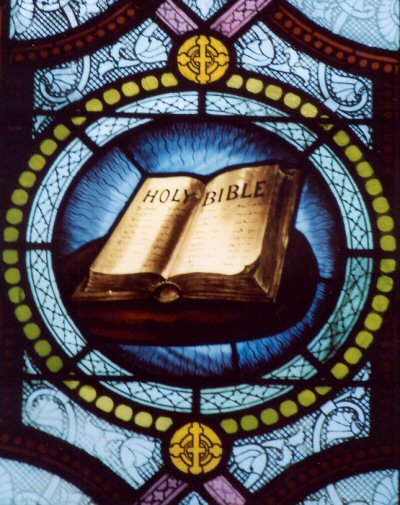
Liturgy of the Word
Christ is made known to us through the
Old Testament which prepares us to recognize Him. In those days, God
inspired men who spoke His message. Now, the New Testament Gospel reading
announces His presence to us directly through His Son. Both
readings bring God's message to us. Our responsibility is to respond.
The First Reading:
From the Old Testament
Priest/Reader: A reading from the
Acts of the Apostles.
First Reading: Acts 14:21-27
After Paul and Barnabas
had proclaimed the good news to that city and made a considerable number of
disciples, they returned to Lystra and to Iconium and to Antioch. They
strengthened the spirits of the disciples and exhorted them to persevere in the
faith, saying, “It is necessary for us to undergo many hardships to enter the
kingdom of God.” They appointed elders for them in each church and, with prayer
and fasting, commended them to the Lord in whom they had put their faith. Then
they traveled through Pisidia and reached Pamphylia. After proclaiming the word
at Perga they went down to Attalia. From there they sailed to Antioch, where
they had been commended to the grace of God for the work they had now
accomplished. And when they arrived, they called the church together and
reported what God had done with them and how he had opened the door of faith to
the Gentiles.
Priest/Reader:
The Word of the
Lord.
All:
Thanks
be to God.
The Responsorial Psalm:
This Psalm praising God, is a prayer to God,
or recommends the practice of virtue. It is sung as an interlude between
the scriptural readings. It provides yet another instructional setting and
invites the assembly to imitate the cantor who sings a repeated response to the
verses of an ancient Psalm many of which are attributed to King David. The
verses are sung first by a cantor (song leader) accompanied by instruments, the
refrain is sung by the people.
Responsorial
Psalm 145:8-9, 10-11, 12-13
Cantor: I will praise your name
forever, my king and my God.
All: R/. I
will praise your name forever, my king and my God.
Cantor: The Lord is gracious and merciful, slow to anger and
of great kindness. The Lord is good to all and compassionate toward all his
works.
All: R/. I
will praise your name forever, my king and my God.
Cantor: Let all your works give you thanks, O Lord, and let
your faithful ones bless you. Let them discourse of the glory of your kingdom
and speak of our might.
All: R/. I
will praise your name forever, my king and my God.
Cantor: Let them make known your might to the children of
Adam, and the glorious splendor of your kingdom. Your kingdom is a kingdom for
all ages. And your dominion endures through all generations.
All: R/. I
will praise your name forever, my king and my God.
The Second Reading:
Taken from the Old Testament.
Second Reading Revelation 21:1-5a
Then I, John, saw a new
heaven and a new earth. The former heaven and the former earth had passed away,
and the sea was no more. I also saw the holy city, a new Jerusalem, coming down
out of heaven from God, prepared as a bride adorned for her husband. I heard a
loud voice from the throne saying, “Behold, God’s dwelling is with the human
race. He will dwell with them and they will be his people and God himself will
always be with them as their God. He will wipe every tear from their eyes, and
there shall be no more death or mourning, wailing or pain, for the old order has
passed away.” The One who sat on the throne said, “Behold, I make all things
new.”
The Alleluia:
An ancient expression of joy anticipating
the Lord's message we will hear in the Gospel.
John 13:34
Cantor: Alleluia!
Alleluia! Alleluia!
ALL: R/. Alleluia! Alleluia! Alleluia!
Cantor: I give you a new commandment, says the Lord: love
another as I have loved you.
ALL: R/. Alleluia! Alleluia! Alleluia!
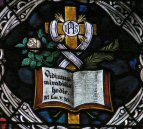 The Gospel:
The Liturgy of the Word is completed
by the reading of the Gospel. Before its reading, the members of the
assembly trace the sign of the cross upon the forehead to indicate their mental
acceptance of the Truth, on the lips to indicate their readiness to announce it,
and over the heart to indicate their sincere desire to accept it into their
lives. The "Good News" of the Gospel tells that God's kingdom has come for
all to hear, accept, and announce to the world for its salvation. It
is God who is speaking to us. Christ comes to teach us by the example of
His life and by His own words.
The Gospel:
The Liturgy of the Word is completed
by the reading of the Gospel. Before its reading, the members of the
assembly trace the sign of the cross upon the forehead to indicate their mental
acceptance of the Truth, on the lips to indicate their readiness to announce it,
and over the heart to indicate their sincere desire to accept it into their
lives. The "Good News" of the Gospel tells that God's kingdom has come for
all to hear, accept, and announce to the world for its salvation. It
is God who is speaking to us. Christ comes to teach us by the example of
His life and by His own words.
Priest: Cleanse my heart and my lips, almighty God, that I may worthily proclaim your
holy Gospel. Through the words of the Gospel may our sins be wiped away.
Priest: The Lord be with you.
All: And with our spirit.
Priest/Deacon: A
reading from the holy Gospel according
to John.
All: Glory
to you, Lord.
The Gospel: John
13:31-33a, 34-35
John wrote to show that Christ was
the Messiah, the Divine Son of God.
 When Judas had left them,
Jesus said, “Now is the son of Man glorified, and God is glorified in him. If
God is glorified in him, God will also glorify him in himself, and God will
glorify him at once. My children, I will be with you only a little while
longer. I give you a new commandment: love one another. As I have loved you,
so you also should love one another. This is how all will know that you are my
disciples, if you have love for one another.”
When Judas had left them,
Jesus said, “Now is the son of Man glorified, and God is glorified in him. If
God is glorified in him, God will also glorify him in himself, and God will
glorify him at once. My children, I will be with you only a little while
longer. I give you a new commandment: love one another. As I have loved you,
so you also should love one another. This is how all will know that you are my
disciples, if you have love for one another.”
Priest/Deacon: The Gospel of the Lord.
All: Praise
to you, Lord Jesus Christ.
Priest: Through the words of the Gospel may our sins be wiped
away.
The Priest's Sermon:
The priest develops, explains, and comments upon the Master's words,
so our minds may be
enlightened, and our
hearts enriched.
(A priestly reflection upon this Gospel)
Profession of Faith:
We state in the
Nicene Creed the principles of our faith in precise and definite terms.
All: I believe in one God, the Father, the Almighty,
maker of heaven and earth, of all that is seen and unseen. I believe in
one Lord, Jesus Christ, the Only Begotten Son of God, born of the Father before
all ages.
God from God, Light from Light, true God from true God, begotten, not made,
consubstantial with the Father; through him all things were made. For us
men and for our salvation he came down from heaven, and by the Holy
Spirit was incarnate of the Virgin Mary, and became man. For our sake he was
crucified under Pontius Pilate, he suffered death and was buried, and rose again
on the third day in accordance with the Scriptures. He ascended into
heaven and is seated at the right hand of the Father. He will come again
in glory to judge the living and the dead and his kingdom will have no end.
I believe in the Holy Spirit, the Lord, the giver of life, who proceeds from
the Father and the Son, who with the Father and the Son is adored and
glorified, who has spoken through the prophets. I believe in one,
holy, catholic and apostolic Church. I confess one Baptism for the
forgiveness of sins and I look for the resurrection of the dead and the
life of the world to come. Amen.
General Intercessions:
We pray for the needs of the pope, civic
leaders, our own needs, those of others,
the sick, the dying, those who have died, the church, and the world.
The response of all to each intercession: Lord, hear our prayer.
All: Lord,
hear our prayer.
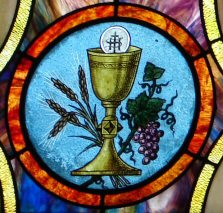 The Liturgy of the Eucharist
The Liturgy of the Eucharist
Gifts of bread and wine
symbolizing ourselves are presented to the priest who will offer them to God the
Father. Through the Holy Spirit, they will become the Body and Blood of
Jesus Christ whom we receive in Holy Communion. Jesus unites Himself with
us for our spiritual nourishment and strength. Today, when individuals do
not present their own personal offerings of bread and wine, the monetary contribution
symbolizes the material of their united sacrifice. The priest makes and
offering of the bread and wine to God.
Preparation of the Bread and
Wine:
Priest: Blessed are you, Lord God of all creation,
for through your goodness we have received the bread we offer you:
fruit of the earth and work of human hands, it will become for us the bread of
life.
All:
Blessed be God for ever.
Priest: By
the mystery of this water and wine may we come to share in the divinity of
Christ, who humbled himself to share
in our humanity.
Priest: Blessed are you, Lord God of all creation, for through your goodness we have
received the wine we offer you; fruit of the vine and work of human hands it will become our spiritual drink.
All: Blessed be God for ever.
Priest: With
humble spirit and contrite heart may we be accepted by you, O Lord, and may our
sacrifice in your sight this
day be pleasing to you, Lord God.
The Priest's Hands are Washed: This
act was traditionally necessary because the priest handled the various gifts
presented by the people. Now, the cleansing act using water reminds the
priest and ourselves of the need to cleanse not only the hands but the soul.
Soon, the priest's hands will hold the actual body of Christ, and we will become
His dwelling place.
Priest: Wash
me O Lord, from m iniquity and cleanse me from my sin.
Pray, brethren, that
my sacrifice and yours may be acceptable to God, the almighty Father.
All: May the Lord accept the sacrifice at your hands for the praise and glory of his
name, for our good and the good of all his holy Church.
Prayer over the Gifts:
Speaking in our name, the priest asks
the Father to accept the gifts we offer through him.
Priest:
O God, who by the wonderful exchange effected in this sacrifice have made us
partakers of the one supreme Godhead, grant, we pray, that, as we have come to
know your truth, we may make it ours by a worthy way of life. Through
Christ our Lord.
Eucharistic Prayer:
(Number Two: The priest may select from several forms).
Priest: The Lord be with you.
All: And with your
spirit.
Priest: Lift up your hearts.
All: We lift them up to the Lord.
Priest: Let us give thanks to the Lord, our God.
All: It is right
and just.
Preface Prayer:
It is truly right and just, our duty and our
salvation, at all times to acclaim you, O Lord, but in this time above all to
laud you yet more gloriously, when Christ our Passover has been sacrificed.
By the oblation of his Body, he brought the sacrifices of old to fulfillment in
the reality of the Cross and, by commending himself to you for our salvation,
showed himself the Priest, the Altar, and the Lamb of sacrifice.
Therefore, overcome with paschal joy, every land,
every people exults in your praise and even the heavenly Powers, with the
angelic hosts, sing together the unending hymn of your glory, as they acclaim:
Acclamation:
Priest
and All:
Holy, Holy, Holy Lord, God of hosts. Heaven and
earth are full of your glory. Hosanna in the highest. Blessed
is he who comes
in the name of the Lord. Hosanna in the highest.
Priest: You are indeed Holy, O Lord, the fountain of all
holiness. Make holy, therefore, these gifts, we pray, by sending down your
Spirit upon them like the dewfall, so that they may become for us the Body and
Blood of our Lord Jesus Christ.
The priest repeats
the words which Christ used at his Last Supper when He changed the bread into
His Body and the wine into His Blood. His Body and Blood are truly present
but under the appearance of bread and wine. The death of Christ is
prolonged in each
of those who receive Him worthily. We apply His death to ourselves so that
we may share His glory. This moment is the most solemn on earth because it
is Divine act which enables us to apply to ourselves the Cross which Christ
willingly took upon Himself.
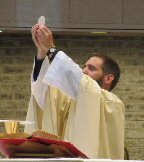 We are called to die to sin and
lift our very selves to God so that we become changed; to do as God would have
us do, to become what God would have us become. Our own little cross can
lift us into union with Christ's Cross so we may earn the joys of everlasting
happiness with God the Father.
We are called to die to sin and
lift our very selves to God so that we become changed; to do as God would have
us do, to become what God would have us become. Our own little cross can
lift us into union with Christ's Cross so we may earn the joys of everlasting
happiness with God the Father.
Priest:
You are indeed Holy, O Lord, the fount of all holiness. Make holy,
therefore, these gifts, we pray, by sending down your spirit upon them like the
dewfall, so that they may become for us the Body and Blood of our Lord Jesus
Christ. At the time he was betrayed and entered willingly into his
Passion, he took bread and, giving thanks, broke it, and gave it to his
disciples, saying:
Take this, all of you, and eat of it, for this is my Body, which will be given
up for you.
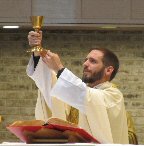 In
a similar way, when supper was ended, he took the chalice and, once more giving
thanks, he gave it to his disciples, saying:
In
a similar way, when supper was ended, he took the chalice and, once more giving
thanks, he gave it to his disciples, saying:
Take this, all of you, and
drink from it, for this is the chalice of my Blood, the Blood of the new and
eternal covenant, which will be poured out for you and for many for the
forgiveness of sins. Do this in memory of me.
Memorial Acclamation: (The priest may
select from several forms).
Priest: The
mystery of faith.
Priest
/ All: We
proclaim your Death, O Lord, and profess your Resurrection until you come again.
Memorial Prayer: (The
priest may select from several forms).
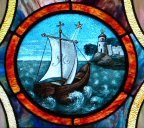 Priest:
Priest:
Therefore, as we celebrate the memorial of
his Death and Resurrection, we offer you, Lord, the Bread of life and the
Chalice of salvation, giving thanks that you have held us worthy to be in your
presence and minister to you. Humbly we pray that, partaking of the Body
and Blood of Christ, we may be gathered into one by the Holy Sprit.
Remember, Lord, your Church, spread throughout the
world, and bring her to the fullness of charity, together with _____ our Pope
and _____ our Bishop and all the clergy. Remember also our brothers and
sisters who have fallen asleep in the hope of the resurrection, and all who have
died in your mercy: welcome them into the light of your face.
Have mercy on us all, we pray, that with the Blessed
Virgin Mary, Mother of God, with blessed Joseph, her Spouse, with the blessed
Apostles, and all the Saints who have pleased you throughout the ages, we may
merit to be coheirs to eternal life,
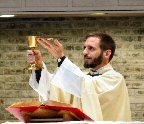 and may praise and glorify you through your
Son, Jesus Christ.
and may praise and glorify you through your
Son, Jesus Christ.
Doxology
Prayer of Praise:
Through
him, with him, and in him, O God, almighty Father, in the unity of the Holy
Spirit, all glory and honor is yours, for ever and ever.
All: Amen.
Communion Rite
In the Liturgy of the Eucharist, we
symbolically offer ourselves to the Lord through the gifts of bread and wine.
At the Consecration, we offer our very lives to be united the God the Father
through the Cross of Christ. In Communion, we find that we have not died
at all, but have come to life. We have surrendered ourselves to God
through His Divine Son, Jesus Christ. In return become ennobled and
enriched. We give up time and we get eternity, we give up our sin and we
receive grace, we surrender our self-will and receive the strength of the Divine
Will, we give up ourselves and we receive everything. For the Son of God
says to us that unless we receive Him we shall not have Divine life in us.
But it is not really we who receive Christ as it is Christ who receives us,
bringing us into Himself.
God makes His Cross the very means
of our salvation and our life. While we have crucified Him, His eternal
love cannot be extinguished. Christ willed to give us the very life we
crucified in our Redemption, the Consecration of Holy Thursday into Communion,
His death into our everlasting life.
The Lord's
Prayer:
Priest: At
the Savior's command and formed by divine teaching, we dare to say:
Priest and
All: Our
Father, who art in heaven, hallowed be they name; Thy kingdom come; Thy will be
done on earth as it is in
heaven. Give us this
day our daily bread, and forgive us our trespasses, as we forgive those who
trespass against us; and lead us not into temptation, but deliver us from evil.
Priest: Deliver us, Lord, we pray, from every evil, graciously
grant peace in our days, that, by the help of your mercy, we may be always free
from sin and safe from all distress, as we await the blessed hope and the coming
of our Savior, Jesus Christ.
All: For the
kingdom, the power and the glory are yours now and forever.
Prayer for
Peace:
Priest: Lord Jesus Christ, who said to your Apostles: Peace I leave
you, my peace I give you, look not on our sins, but on the faith of your Church,
and graciously grant her peace and unity in accordance with your will. Who
live and reign for ever and ever.
All: Amen.
Priest: The peace of the Lord be with
you always.
All: And with your spirit.
Priest: Let us offer each other the sign of peace.
Breaking of the Bread:
Priest: May this mingling of the Body and Blood of our Lord
Jesus Christ bring eternal life to us who receive it.
Priest and All: Lamb of God, you take away the sins of the world,
have mercy on us.
Lamb of God, you take away the sins of the world, have mercy on us.
Lamb of God, you take away the sins of the world, grant us peace.
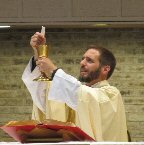 Priestly Preparation: May
the receiving of your Body and Blood, Lord Jesus Christ, not bring me to
judgment and condemnation, but through your loving mercy be for me protection in
mind and body and a healing remedy.
Priestly Preparation: May
the receiving of your Body and Blood, Lord Jesus Christ, not bring me to
judgment and condemnation, but through your loving mercy be for me protection in
mind and body and a healing remedy.
Priest: Behold
the Lamb of God, behold him who takes away the sins of the world. Blessed
are those called to the supper of the Lamb.
Priest and All: Lord,
I am not worthy that you should enter under my roof, but only say the world and
my soul shall be healed.
Priest: May the Body of Christ keep me safe for eternal life.
May
the Blood of Christ keep me safe for eternal life.
Communion Antiphon:
John 15: 1, 5
I am the true vine and you are the branches, says the Lord. Whoever
remains in me, and I in him, bears fruit in plenty, alleluia.
Communion of the Faithful:
Priest:
The Body of Christ.
The Faithful: Amen.
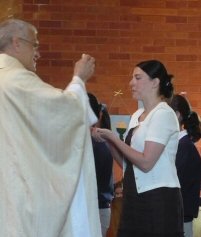
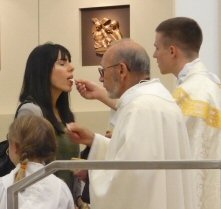
Priest/Deacon/
Extraordinary Eucharistic Minister:
The Blood of Christ.
The Faithful: Amen.
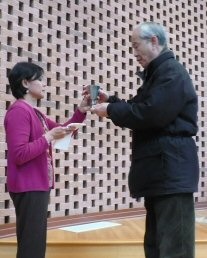
Cleansing of the Vessels:
Priest: What has passed our lips as food, O Lord, may we
possess in purity of heart, that what has been given to us in time may be our
healing for eternity.
Prayer after Communion:
Priest: Let us pray.
Priest: Graciously
be present to your people, we pray, O Lord, and lead those you have imbued with
heavenly mysteries to pass from former ways to newness of life. through
Christ our Lord.
Concluding Rite
Priest: The Lord be with you.
All: And
with your spirit.
Priest: Bow
down for the blessing.
Dismissal Prayer: (The priest may select
from several forms)
Priest: May God, who by the Resurrection of his Only Begotten Son
was pleased to confer on you the gift of redemption and of adoption, give you
gladness by his blessing.
All: Amen.
Priest: May he, by whose redeeming work you have received the gift of
everlasting freedom, make you heirs to an eternal inheritance.
All: Amen.
Priest: And may you, who have already risen with Christ in Baptism
through faith, by living in a right manner on this earth, be united with him in
the homeland of heaven.
All: Amen.
Final Blessing:
Priest: And may the blessing of almighty God, the Father, and the Son,
and the Holy Spirit, come down on you and remain with you for ever.
All: Amen.
Priest: Go forth, the Mass is ended, alleluia, alleluia.
All: Thanks be to God, alleluia, alleluia.
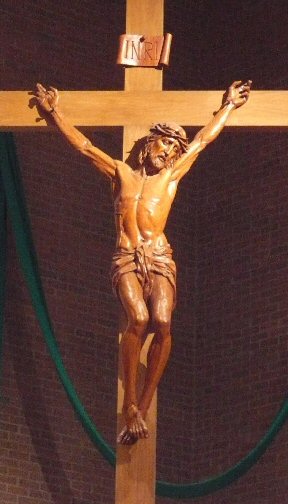 O my Jesus, forgive us our sins.
O my Jesus, forgive us our sins.
Save us from the fires of hell.
Lead all souls to heaven,
especially those in most need of your mercy.
www.Divinemasterplanforlife.com
www.Saintsnheaven.com
Top
Home Page
Liturgical
Year Cycle 18-19

 The Gospel:
The Liturgy of the Word is completed
by the reading of the Gospel. Before its reading, the members of the
assembly trace the sign of the cross upon the forehead to indicate their mental
acceptance of the Truth, on the lips to indicate their readiness to announce it,
and over the heart to indicate their sincere desire to accept it into their
lives. The "Good News" of the Gospel tells that God's kingdom has come for
all to hear, accept, and announce to the world for its salvation. It
is God who is speaking to us. Christ comes to teach us by the example of
His life and by His own words.
The Gospel:
The Liturgy of the Word is completed
by the reading of the Gospel. Before its reading, the members of the
assembly trace the sign of the cross upon the forehead to indicate their mental
acceptance of the Truth, on the lips to indicate their readiness to announce it,
and over the heart to indicate their sincere desire to accept it into their
lives. The "Good News" of the Gospel tells that God's kingdom has come for
all to hear, accept, and announce to the world for its salvation. It
is God who is speaking to us. Christ comes to teach us by the example of
His life and by His own words. When Judas had left them,
Jesus said, “Now is the son of Man glorified, and God is glorified in him. If
God is glorified in him, God will also glorify him in himself, and God will
glorify him at once. My children, I will be with you only a little while
longer. I give you a new commandment: love one another. As I have loved you,
so you also should love one another. This is how all will know that you are my
disciples, if you have love for one another.”
When Judas had left them,
Jesus said, “Now is the son of Man glorified, and God is glorified in him. If
God is glorified in him, God will also glorify him in himself, and God will
glorify him at once. My children, I will be with you only a little while
longer. I give you a new commandment: love one another. As I have loved you,
so you also should love one another. This is how all will know that you are my
disciples, if you have love for one another.” The Liturgy of the Eucharist
The Liturgy of the Eucharist We are called to die to sin and
lift our very selves to God so that we become changed; to do as God would have
us do, to become what God would have us become. Our own little cross can
lift us into union with Christ's Cross so we may earn the joys of everlasting
happiness with God the Father.
We are called to die to sin and
lift our very selves to God so that we become changed; to do as God would have
us do, to become what God would have us become. Our own little cross can
lift us into union with Christ's Cross so we may earn the joys of everlasting
happiness with God the Father.
 In
a similar way, when supper was ended, he took the chalice and, once more giving
thanks, he gave it to his disciples, saying:
In
a similar way, when supper was ended, he took the chalice and, once more giving
thanks, he gave it to his disciples, saying: Priest:
Priest:  and may praise and glorify you through your
Son, Jesus Christ.
and may praise and glorify you through your
Son, Jesus Christ. Priestly Preparation: May
the receiving of your Body and Blood, Lord Jesus Christ, not bring me to
judgment and condemnation, but through your loving mercy be for me protection in
mind and body and a healing remedy.
Priestly Preparation: May
the receiving of your Body and Blood, Lord Jesus Christ, not bring me to
judgment and condemnation, but through your loving mercy be for me protection in
mind and body and a healing remedy.

